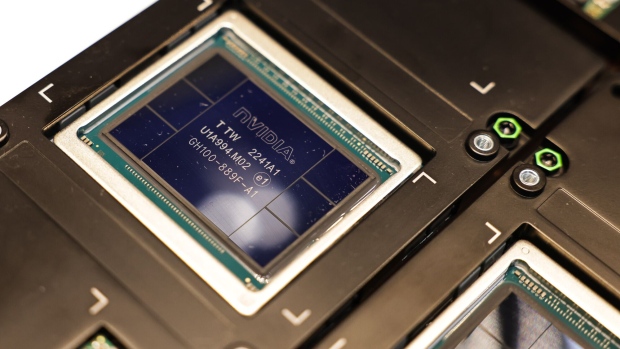Oct 23, 2023
Nvidia to Take on Intel With Arm-Based PC Chips, Reuters Says
, Bloomberg News

(Bloomberg) -- Nvidia Corp. is using Arm Holdings Plc technology to develop chips that would challenge Intel Corp. processors in personal computers, ratcheting up competition between the two semiconductor makers, according to people familiar with the situation.
Nvidia, whose artificial intelligence accelerator chips already dominate that market, is attempting to make central processing units for PCs, said the people, who asked not to be identified because the matter is private. The CPUs would run Microsoft Corp.’s Windows operating system and go on sale as soon as 2025.
Intel’s main rival in PCs, Advanced Micro Devices Inc., is now also working on Arm-based processors as well, according to the people. AMD currently licenses Intel’s technology.
The news jarred investors, sending Intel shares down 3.1% on Monday, though it’s not the first attempt to use Arm technology — common on smartphones — to crack the PC processor industry. A number of companies have made a run at traditional PC processors over the years with little impact. Nvidia itself made a previous go at the market under former executive Rene Haas, who now runs Arm, more than a decade ago.
Windows RT, which Microsoft announced at the CES show in 2011, was designed to run on Arm designs. The first of Microsoft’s Surface devices was based on that operating system and used an Nvidia Tegra chip. But the those early models didn’t catch on with consumers.
Apple Inc., though, has provided a more recent model for how to replace Intel technology. The company switched from using Intel processors in its Mac computers with in-house designs that are based on Arm’s standards. And it has credited the change with boosting Mac sales. Qualcomm Inc., the biggest maker of phone chips, is currently the only other maker of Arm-based chips for Windows-based PCs.
Reuters previously reported on Nvidia’s effort, which sent shares of Arm up 4.9% in New York. Nvidia gained 3.8%. Representatives of AMD, Arm and Nvidia declined to comment.
The move would attack Intel’s home turf at a difficult time for the pioneer of PC processors. Under Chief Executive Officer Pat Gelsinger, Intel has been fighting to regain market share and its technological edge. The addition of Nvidia and AMD to a field that includes Apple and Qualcomm only adds to its challenges.
Nvidia — the world’s most valuable chipmaker, with a market capitalization of about $1.1 trillion — is an increasingly formidable rival. The company used its dominance in graphics cards for video games to develop chips that can power AI computing. That’s led to an explosion in orders as tech companies around the world adopt artificial intelligence tools — and need more processing power to run them. Nvidia was the first chipmaker to pass a $1 trillion valuation earlier this year.
Intel, in contrast, has seen its valuation slide in recent years. Even with a rally in 2023, the company currently stands at about $142 billion.
And then there’s AMD. Under CEO Lisa Su, that company has shed its longtime reputation as a low-budget competitor to Intel and delivered several generations of products that have won market share. AMD had previously said it would consider Arm-based products but shelved that effort. More recently, Su has said that the company would produce custom products with combinations of technology, including Arm, if asked by customers.
Like Nvidia’s PC chips, Arm’s Arm-based processors could go on sale as early as 2025, people familiar with the matter said.
(Updates with Nvidia’s past PC efforts starting in third paragraph.)
©2023 Bloomberg L.P.





